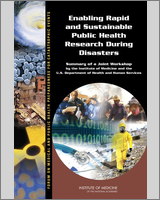View in own window
| 1:00 p.m. |
Welcome and Introductions
|
| |
AUBREY MILLER
|
| 1:15 p.m. |
Moving Forward: Implementing a Research Agenda in
Disasters
|
| |
NICOLE LURIE
|
| 2:00 p.m. |
Plenary Session: Overview of Case Studies Demonstrating
Health Research Needs, Actions, and Lessons Learned
|
Goal: Explore past research responses, needs, and priority issues of
concern for framing the workshop sessions and discussions.
View in own window
| |
Overview and Introductions/Facilitator
BOB URSANO, Director, Center for
the Study of Traumatic Stress, Uniformed Services
University of the Health Sciences
|
| |
Lessons from Katrina
|
| |
Research Following September 11, 2001
|
| |
Hurricane Sandy
|
| 4:45 p.m. |
Concluding Remarks
|
| |
DONALD A. B. LINDBERG
|
Plenary Session 2: Morning Speakers
Goal: Identifying data gaps in disasters and implementing
research looking forward.
View in own window
| |
FRANCIS COLLINS
|
| |
LINDA BIRNBAUM
|
| |
JOHN HOWARD
|
| |
Morning Concurrent Panel Sessions
|
PANEL 1: ADDRESSING
INSTITUTIONAL REVIEW BOARD BARRIERS
TO HEALTH RESEARCH
IMPLEMENTATION
Facilitator:
DIANE DIEULIIS, Deputy Director, Office of Policy and Planning,
Assistant Secretary of Preparedness and Response
Goals: Explore strategies to balance human subject protections
while enabling timely IRB review of research protocols, discuss
strategies to obtain informed consent in emergency situations, and
consider the ethics of data collection for special populations in
disasters.
- 1.
MICHAEL GOTTESMAN, Deputy Director for Intramural
Research, National Institutes of Health
- 2.
NELL ALLBRITTON, IRB Director, Louisiana Department
of Health and Hospitals
- 3.
HOLLY TAYLOR, Core Faculty, Johns Hopkins Berman
Institute of Bioethics
PANEL 2: PARTNERING WITH THE
COMMUNITY TO ENABLE ACCESS AND
BASELINE DATA
Facilitators:
JOSEPH “CHIP” HUGHES,
Program Director, Worker Education and Training Branch, NIEHS
JACK HERRMANN, Senior Advisor & Chief,
Public Health Programs, NACCHO
Goals: Explore how to effectively engage community and citizen
scientists in disaster research. Consider strategies to strengthen
the interface and collaborations with first responders and emergency
management, health departments, workers, and others to promote
successful disaster research.
- 1.
DAVID LAKEY, Commissioner, Texas Department of
State Health Services
- 2.
STEPHEN BRADBERRY, Executive Director, Alliance
Institute
- 3.
CRAIG SLATIN, Principal Investigator and Director
of The New England Consortium
- 4.
ANTHONY SPEIER, Associate Professor of Clinical
Psychiatry, Louisiana State University Health Sciences Center
PANEL 3: IMPROVING DATA
COLLECTION CAPABILITIES AND INFORMATION
RESOURCES
Goals: Explore new data collection tools and strategies,
infrastructure needs to enable effective and accessible data
sharing, and field implementation.
- 1.
AUBREY MILLER, Senior Medical Advisor, NIEHS
- 2.
MICHAEL HEUMANN, Oregon Public Health, Council of
State and Territorial Epidemiologists
- 3.
GAMUNU WIJETUNGE AND ELLEN
SCHENK, NHTSA
- 4.
LAUREN LEWIS, Chief of Health Studies Branch,
National Center for Environmental Health (NCEH/CDC)
Lunch
Afternoon Concurrent Panel Sessions
PANEL 4: CONSIDERATIONS
FOR RAPID AND SUSTAINED FUNDING
MECHANISMS FOR RESEARCH IN
DISASTERS
Goals: Consider rapid funding mechanisms to enable nimble
and flexible grant distribution. Discuss strategies for
designing funding mechanisms that would allow for
sustainable disaster research protocols, which have the
flexibility to immediately activate additional protocols
during a disaster.
- 1.
DENNIS WENGER, Program Director,
Infrastructure Systems Management and Extreme Events,
National Science Foundation
- 2.
FAITH MITCHELL, President and CEO,
Grantmakers In Health
- 3.
SARAH LISTER, Specialist in Public Health
and Epidemiology, Congressional Research Service
PANEL 5: IMPROVING THE
ROLE OF EXTRAMURAL CLINICAL AND
ACADEMIC RESEARCHERS, CENTERS, AND
NETWORKS
Goals: Explore the essential role for the academic and
clinical research community and other partners in collecting
data, data sharing, communications, and other priorities to
enable timely research. Discuss multiple institutions
working together as one entity, and the characteristics of
an ongoing, sustained research network.
- 1.
LORI PEEK, Codirector, Center for Disaster
and Risk Analysis, Colorado State University
- 2.
GARY MACHLIS, Colead of Strategic Sciences
Group, U.S. Department of the Interior
- 3.
PAUL SELIGMAN, Executive Director, Global
Regulatory Policy, Amgen
- 4.
SHARON CROISANT, Associate Professor,
Community Outreach and Education Program of the NIEHS Center
in Environmental Toxicology, University of Texas Medical
Branch (UTMB)
PANEL 6: COORDINATING
LOGISTICS TO EXECUTE RAPID
RESEARCH IN DISASTER RESPONSE
Goals: Discuss triggers for go/no-go scenarios,
just-in-time training for research responders, integration
of disaster research response into the ICS structure, and
corresponding logistical needs when working in disaster
settings.
- 1.
SHELLEY DUTEAUX, Assistant Deputy Director
of Public Health Emergency Preparedness, California
Department of Public Health
- 2.
CHARLES CAIRNS, Associate Director, U.S.
Critical Illness and Injury Trials Group
- 3.
JOSEPH “CHIP”
HUGHES, Program Director, Worker Education and
Training Branch, NIEHS
- 4.
JOSEPH BARBERA, CoDirector of the Institute
for Crisis, Disaster and Risk Management at George
Washington University
Break
Plenary Session 3: Wrap Up and Next Steps Main
Auditorium
Goals: Provide bold strategies for improved inclusion and
integration of all stakeholders to support the timely
identification of health research priorities, and collection of
longer-term data to understand health impacts, efficacy of
responses, and risk factors to strengthen resiliency and future
preparedness.
REPORT BACK FROM PANEL DISCUSSIONS
Goal: Top 5 action items from each category for a 5-year
horizon to improve our health research response
capabilities
CLOSING RESPONSE PANEL:
ACTIONS TO BUILD THE FUTURE FOR
DISASTER RESEARCH
Facilitator:
BERNARD GOLDSTEIN, Emeritus Professor and
Dean,
University of Pittsburgh Graduate School of Public Health
- 1.
MARCIA MCNUTT, Editor-in-Chief,
Science
- 2.
JACK HERRMANN, Senior Advisor and Chief,
Public Health Programs, NACCHO
- 3.
IRWIN REDLENER, Director, National Center
for Disaster Preparedness
- 4.
SALLY PHILLIPS, Acting Deputy Assistant
Secretary, Office of Health Affairs, DHS
- 5.
PAUL BIDDINGER, Medical Director for
Emergency Preparedness, Massachusetts General Hospital and
Partners Healthcare

